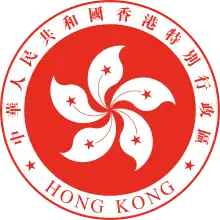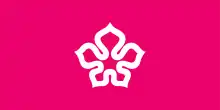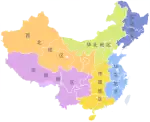Hong Kong
Hong Kong (/ˌhɒŋˈkɒŋ/ (![]() listen); Chinese: 香港, Hong Kong Cantonese: [hœ́ːŋ.kɔ̌ːŋ] (
listen); Chinese: 香港, Hong Kong Cantonese: [hœ́ːŋ.kɔ̌ːŋ] (![]() listen), literally "Fragrant Port"), officially The Hong Kong Special Administrative Region of The People's Republic of China,[17] is one of two Special Administrative Regions (SARs) of the People's Republic of China (the other is Macau).
listen), literally "Fragrant Port"), officially The Hong Kong Special Administrative Region of The People's Republic of China,[17] is one of two Special Administrative Regions (SARs) of the People's Republic of China (the other is Macau).
Hong Kong | |||||
|---|---|---|---|---|---|
Hong Kong Special Administrative Region of the People's Republic of China
| |||||
 Emblem | |||||
_(%252Ball_claims_hatched).svg.png.webp) Location of Hong Kong within China | |||||
| Sovereign state | China | ||||
| British possession | 26 January 1841 | ||||
| Treaty of Nanking | 29 August 1842 | ||||
| Convention of Peking | 24 October 1860 | ||||
| New Territories lease | 9 June 1898 | ||||
| Imperial Japanese occupation | 25 December 1941 to 30 August 1945 | ||||
| Sino-British Joint Declaration | 19 December 1984 | ||||
| Handover to China | 1 July 1997 | ||||
| Administrative centre | Tamar | ||||
| Largest district by population | Sha Tin | ||||
| Official languages |
| ||||
| Cantonese[lower-alpha 1] | |||||
| Traditional Chinese[lower-alpha 2] English alphabet | |||||
| Ethnic groups (2016) | 92.0% Chinese 2.5% Filipino 2.1% Indonesian 1.1% Indian 0.8% White 0.3% Nepalese 1.6% Others[6] | ||||
| Demonym(s) | Hongkonger | ||||
| Government | Devolved executive-led government within a unitary one-party state[7] | ||||
| John Lee | |||||
| Eric Chan | |||||
• Council President | Andrew Leung | ||||
• Chief Justice | Andrew Cheung | ||||
| Legislature | Legislative Council | ||||
| National representation | |||||
| 36 deputies | |||||
| 203 delegates[8] | |||||
| Area | |||||
• Total | 2,754.97[9] km2 (1,063.70 sq mi) (168th) | ||||
• Water (%) | 59.70% (1644.79 km2; 635.05 sq mi)[9] | ||||
• Land | 1,110.18 km2 (428.64 sq mi)[9] | ||||
| Highest elevation (Tai Mo Shan) | 957 m (3,140 ft) | ||||
| Lowest elevation | 0 m (0 ft) | ||||
| Population | |||||
• 2022 estimate | |||||
• 2021 census | |||||
• Density | 6,801[12]/km2 (17,614.5/sq mi) (4th) | ||||
| GDP (PPP) | 2022 estimate | ||||
• Total | |||||
• Per capita | |||||
| GDP (nominal) | 2022 estimate | ||||
• Total | |||||
• Per capita | |||||
| Gini (2016) | high | ||||
| HDI (2021) | very high · 4th | ||||
| Currency | Hong Kong dollar (HK$) (HKD) | ||||
| Time zone | UTC+08:00 (HKT) | ||||
| Date format | dd/mm/yyyy yyyy年mm月dd日 | ||||
| Mains electricity | 220 V–50 Hz | ||||
| Driving side | left[lower-alpha 3] | ||||
| Calling code | +852 | ||||
| ISO 3166 code |
| ||||
| Internet TLD |
| ||||
| License plate prefixes | None for local vehicles, 粤Z for cross-boundary vehicles | ||||
It is one of the richest and most developed parts in the world, and one where the cost of living is one of the highest. Hong Kong grew quickly in the decades after World War II, becoming a famous world-class financial centre. Hong Kong was one of the last territories of the British Empire until 1997, when United Kingdom handed it over to China. China then promised to grant it special status for 50 years.
The population of Hong Kong is over seven million. The economy has rapidly grown from a trading port to a very rich city. Hong Kong has the most skyscrapers in the world.
Hong Kong is divided into 3 main parts:
- Hong Kong Island
- Kowloon
- New Territories (including 235 outlying islands)
Hong Kong was a British colony from 1842 to 1997 as China surrendered the city after losing the Second Opium War. After the handover in 1997, Hong Kong became under Chinese control under special status.
Hong Kong has its own constitution that is different from that of the People's Republic of China (PRC).
Climate
Hong Kong is in a sub-tropical area, and has monsoon winds. It is cool and wet in winter (January-March), hot and rainy from spring through summer (April-September), and warm, sunny and dry in the autumn (October-December). The rainy season is from May until September. In summer and early autumn, there is a frequent threat of typhoons.
Population and language
The population of Hong Kong reached 7.5 million (7,503,100) in 2023. Most of the people in Hong Kong are Chinese. Hong Kong is one of the most densely populated countries in the world. It has an overall population density of 6,300 people per square kilometre.
Hong Kong has one of the world’s lowest birth rates — 1.05 per woman at an age of being capable to give birth as of 2019. This is far below the rate needed to replace each person, 2.1.
People from Hong Kong mainly speak Cantonese. Students are required to learn English at school. Ever since Hong Kong became a part of China, the number of people who speak Mandarin has increased because Mandarin is the official language of China.
Public holidays
In Hong Kong, 17 days of the year are public holidays:
- 1 January - New Year's Day, the beginning of the year
- Chinese New Year (3 public holidays)
- Ching Ming Festival, also known as "Tomb Sweeping Day"
- Easter (3 public holidays)
- 1 May - Labour Day
- The Buddha's birthday
- Dragon Boat Festival
- 1 July - Hong Kong SAR Establishment Day
- The day after Mid-Autumn Festival
- 1 Oct - Chinese National Day
- Chung Yeung Festival - a day when people honour their ancestors, similar to "Tomb Sweeping Day"
- 25 December - Christmas
- 26 December - Boxing Day
Currency
There are coins from 10 cents to 10 Hong Kong Dollars and bank-notes (paper money bills) from $10 to $1000. One American dollar equals to HK$7.80±0.05 Hong Kong Dollars, according to the official pegged exchange rate.
Public transport
- Mass Transit Railway (MTR) which was established in 1979, owns seven lines (10 lines after KCR merger),
- Kwun Tong Line (running between Whampoa and Tiu Keng Leng)
- Tsuen Wan Line (running between Tsuen Wan and Central)
- Island Line (running between Kennedy Town and Chai Wan)
- South Island Line (running between Admiralty and South Horizons)
- Tseung Kwan O Line (running between North Point and Po Lam/LOHAS Park)
- Tung Chung Line (running between Tung Chung and Hong Kong)
- Airport Express (running between AsiaWorld-Expo and Hong Kong)
- Disneyland Resort Line (running between Sunny Bay and Disneyland Resort)
- East Rail Line (running between Lo Wu/Lok Ma Chau and Admiralty)
- Tuen Ma Line (running between Tuen Mun and Wu Kai Sha)
- Bus: there are four major bus companies in Hong Kong, namely KMB which mainly serves Kowloon and New Territories, New World First Bus, which mainly serves Hong Kong Island, New Lantau Bus, which mainly serves Lantau Island, and Citybus, which mainly serves airport routes.
- Public Light Bus: in the 1960s, it was an illegal transportation, but later on, the government noticed that if there were only buses in Hong Kong, then some villages in N.T. will not have a public transport. Therefore, the Legislative Council made it legal and under government regulation.
- Tram (running between Kennedy Town, Happy Valley, and Shau Kei Wan)
- Peak Tram (running between Garden Road and Victoria Peak)
- Taxi [Red (Kowloon and Hong Kong Island), Green (New Territories), and Blue (Lantau Island)]
- Ferry (Lots of different companies, including the Star Ferry, First Ferry and Fortune Ferry)
- Hong Kong International Airport is the main airport. It is the busiest airport in the world in terms of cargo traffic.
Education
Hong Kong's education system is mostly based on the English system. Children are required to be in school from age 6 until completing secondary school (high school) at age 18.
Universities
Hong Kong has 11 Universities:
- University of Hong Kong
- Chinese University of Hong Kong
- Hong Kong University of Science and Technology
- Hong Kong Polytechnic University
- City University of Hong Kong
- Hong Kong Baptist University
- Education University of Hong Kong
- Lingnan University
- Hong Kong Metropolitan University
- Hong Kong Shue Yan University
- Hang Seng University of Hong Kong
Housing in Hong Kong
According to the International Housing Affordability survey, Hong Kong has the most unaffordable housing market in the world since 2010.[18][19]
Timeline of Hong Kong
Here is a brief history of Hong Kong:

Around 4000 BC
- Sea levels rose above 100 meters
Around 3500 BC
- Ceramic forms decorated with a wide range of patterns
Around 2000 BC
- Bronze weapons, knives, arrowheads & tools.
- Metal worked locally
Around 500 BC
- Ancient Chinese writing developed
221 BC
- People from Mainland China came to Hong Kong
220 BC
- Coins from the Chinese Han period were used in Hong Kong
1555
- A Portuguese named Jorge Álvares was the first European to reach Hong Kong
1799
- China banned the drug trade in Hong Kong
1800
- Opium became a huge business

1839
- Lin Zexu was appointed Special Commissioner
- The First Opium war began
1841
- Hong Kong was given to the British and became a dependent territory of United Kingdom
- Lord Palmerston wrote that Hong Kong was a barren island with only a few houses on it
January 26, 1841
- The British flag was raised at Possession Point, on Hong Kong Island
August 1841
- Sir Henry Pottinger became Hong Kong's first governor
- The Treaty of Nanjing was signed, ending the First Opium War
1860
- China was defeated in the Second Opium War. Boundary Street and Stonecutter's Island were leased to Britain
1888
- The Peak Tram started operating on Hong Kong Island
1898
- Lantau Island and the New Territories were leased to the British for 99 years
1900s
- Hong Kong became a refuge for exiles from China
1920s-1930s
- Western dress began to come in fashion for the locals
1933-1934
- Father Daniel Finn began excavations on Lamma Island
1941
- Refugees fleeing the Chinese Communist Party came to Hong Kong



December 8, 1941
- The Empire of Japan invaded Hong Kong
December 25, 1941
- The British authorities surrendered Hong Kong to the Japanese Army
August 1945
- Britain reclaimed its territory after Japan's surrender
1949
- Double-decker buses were introduced to Hong Kong
1950
- Hong Kong became a free port
1953
- The Shek Kip Mei Estate was built, establishing the program of public housing
1955
- A Han period tomb was discovered near Lei Cheng Uk
1983
- The Hong Kong dollar was tied to the US dollar
1984
- China and Britain signed the Sino-British Joint Declaration
1990
- The Hong Kong Basic Law was confirmed
1997
- Asia's financial crisis
- Archaeologists discovered 20 graves on the island of Ma Wa
- Tung Chee Wa elected as the first Chief Executive of Hong Kong. Voting was conducted by 400 committees of an electoral college whose members are appointed by the Chinese Government.
July 1, 1997
- Hong Kong became a Special Administrative Region of China for 50 years
1998
- Hong Kong International Airport opened, replacing Kai Tak Airport in Kowloon
June 2002
- Tung Chee Hwa was elected as Chief Executive for a second term.
2003
- Citizens wanted a more democratic and republican system
- The SARS epidemic began
March 10, 2005
- Tung Chee Hwa resigned as chief executive because of health problems.
June 16, 2005
- Donald Tsang Yam-kuen was elected unopposed as Chief Executive.
March 2012
- Leung Chun Ying was elected as Chief Executive.
2014
- People occupied the Central region to demand universal suffrage for the next chief executive election, to take place in 2017.
2015
- The government voted against the universal suffrage demanded by the people.
2016
- There were more protests in Mong Kok because the government voted against universal suffrage. Police had to use pepper spray and Tear gas on the protesters to get them to leave.
2019
- Protestors in Hong Kong demonstrated against a new extradition law proposed by the Hong Kong government.[20][21]It was the largest protest in Hong Kong's history.[22] This law would allow Hong Kong to send people to other jurisdictions where they have committed a crime, including mainland China.[23] People opposed this because of the poor reputation of China due to allegations of torture, forced confessions and arbitrary detentions. There were fears that the bill would just bring Hong Kong closer under China's control, even though Hong Kong have their own judicial system.[24]
2020
Media
Hong Kong has a few media companies, notably Television Broadcasts Limited (TVB), HK Television Entertainment (HKTVE), and Fantastic Television. Access to television is not affected by Chinese regulations, such as the Great Firewall, which filters and blocks certain programs.
Places in Hong Kong
- Hong Kong Disneyland
- Victoria Peak
- Victoria Park
- Ocean Park
- Man Mo Temple
- Repulse Bay
- Hong Kong Park
- Yuen Po Street Bird Garden
- Hong Kong Museum of History
- Hong Kong Space Museum
- Hong Kong Museum of Science & Technology
- Wong Tai Sin Temple
- Fung Ying Sin Koon
- Kowloon Walled City
- Kowloon Mosque and Islamic Centre
- Avenue of Stars, Hong Kong
- Sham Tung Uk
- Po Lin Monastery and the Big Buddha on Lantau Island (currently the largest bronze Buddha in world)
- Cheung Chau (Long Island)
- Chek Lap Kok
- Clock Tower, Hong Kong
Notes
- No specific variety of Chinese is official in the territory. Residents predominantly speak Cantonese, the de facto regional standard.[1][2][3]
- For all government use, documents written using Traditional Chinese characters are authoritative over ones inscribed with Simplified Chinese characters.[4] English shares equal status with Chinese in all official proceedings.[5]
- Except for the Hong Kong-Zhuhai-Macao Bridge Hong Kong Link Road, which drives on the right.[16]
References
- Leung 2016.
- Official Languages Ordinance.
- Population By-Census 2016, pp. 31, 51–52
- Legislative Council Disclaimer and Copyright Notice
- Use of Chinese in Court Proceedings 2011
- Population By-Census 2016, p. 46.
- "China (People's Republic of) 1982 (rev. 2004)". Constitute project. Retrieved 25 August 2019.
- Cheung 2017.
- "Survey and Mapping Office – Circulars and Publications". Survey and Mapping Office. Retrieved 20 October 2020.
- "Mid-year population for 2022" (Press release). Government of Hong Kong. 11 August 2022. Retrieved 4 September 2022.
- "Key statistics of the 2021 and 2011 Population Census" (PDF). census2021.gov.hk. Retrieved 15 March 2022.
- "Main Tables – 2021 Population Census". census2021.gov.hk. Retrieved 15 March 2022.
- "World Economic Outlook Database, October 2022". IMF.org. International Monetary Fund. Retrieved 21 October 2022.
- Household Income Distribution 2016, p. 7
- "Human Development Report 2021/2022" (PDF). United Nations Development Programme. 8 September 2022. Retrieved 8 September 2022.
- Technical Legislative Amendments on Traffic Arrangements for the Hong Kong-Zhuhai-Macao Bridge 2017
- "Basic Law". www.basiclaw.gov.hk. Retrieved 2021-12-12.
- "The World's Most Unaffordable Housing Markets". FortuneBuilders. 2014-01-24. Retrieved 2020-06-24.
- Kwan, Shawna (21 January 2019). "Hong Kong Housing Is World's Least Affordable for 9th Year". Bloomberg News. Retrieved 21 June 2020.
- Master, Farah (21 June 2019). "Black-clad, anti-extradition protesters flood streets of Hong Kong". National Post. Retrieved 2020-06-24.
- "HONG KONG'S PROTESTS EXPLAINED". Amnesty International. 9 September 2019.
- "By Using North Korea and Iran, Beijing Seeks to Divert Attention From Hong Kong Mass Protests". www.theepochtimes.com. 2019-06-18. Retrieved 2020-06-24.
-
- Euan McKirdy (June 21, 2019). "Thousands of protesters again hit Hong Kong's streets". Al Jazeera.
- "Hong Kong protests: Thousands surround police headquarters". BBC News. 21 June 2019. Retrieved 2020-06-24.
- "Hong Kong security law: What is it and is it worrying?". BBC News. 2020-06-30. Retrieved 2020-11-10.
Other websites
- "Hong Kong". The World Factbook. CIA. 23 August 2010. Archived from the original on 14 May 2009. Retrieved 17 September 2010.

